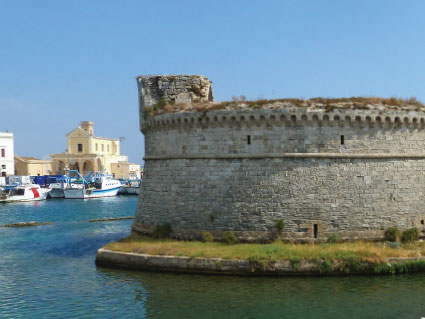




Gallipoli (from the Greek Kalè Polis: lovely town). The origin of the “Lovely Town” is unknown; many believe it was founded by the Greeks, according to others by the Messapii, that inhabited the south-eastern peninsula.
Gallipoli, a small island on the Ionian sea joined to the headland by a bridge, still preserves in its old town the magnificent Aragonese castle opened onto the site of the ancient walls by a scenic road called the “Rivellino”. The narrow lanes of the old town, erected during the Byzantium Age, shape an immense labyrinth spreading like a spider web. Such an intricate system of road functioned as a clever defence against the invaders, who, disoriented, could not conquer the town. The cultural and religious traditions of Gallipoli are witnessed by the secular buildings scattered in the city such as the 17th and 18th noble palaces; the underground oil-mills excavated into the foundations of the city that in the 17th century produced lamp oil; the majestic cathedral of St. Agata, which boasts a superb baroque fašade inlaid with carparo, the local stone, more than 700 sq m of painting canvas inside; the Old Pharmacy decorated with ceramics where drugs were stored; the monasteries and the confraternitiesĺ oratories founded in the second half of the 17th century as guilds. The marvellous oratory of St. Maria della Purità that housed the so-called “vastagi” or “bastagi”, the slang for longshoremen, boasts wonderful choir stalls, paintings, frescos, and a rare majolica floor. The oratory of Ss. Crocifisso that housed the barrel builders, called “uttari”, is characterized by a sienna yellowish-brown fašade and hosts an impressive wooden statue of Dead Christ.
Tourist Office
Via A. De Pace, 86
+39 0883/262529
iatgallipoli@pugliapromozione.it
Provincia di Lecce - Tourist Office
+39 0832/683860 0832/683772
turismo@provincia.le.it
Ass. Gallipoli Nostra
+39 3488956109
ass.gallipolinostra@libero.it
Town Police
+39 0833/275545